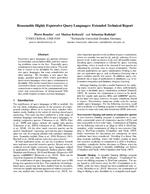Techreport3020: Unterschied zwischen den Versionen
Aus International Center for Computational Logic
Sebastian Rudolph (Diskussion | Beiträge) (Die Seite wurde neu angelegt: „{{Publikation Erster Autor |ErsterAutorVorname=Pierre |ErsterAutorNachname=Bourhis |FurtherAuthors=Markus Krötzsch; Sebastian Rudolph; }} {{Techreport |Title…“) |
Sebastian Rudolph (Diskussion | Beiträge) Keine Bearbeitungszusammenfassung |
||
| Zeile 2: | Zeile 2: | ||
|ErsterAutorVorname=Pierre | |ErsterAutorVorname=Pierre | ||
|ErsterAutorNachname=Bourhis | |ErsterAutorNachname=Bourhis | ||
|FurtherAuthors=Markus Krötzsch; Sebastian Rudolph; | |FurtherAuthors=Markus Krötzsch; Sebastian Rudolph; | ||
}} | }} | ||
{{Techreport | {{Techreport | ||
|Title=Reasonable Highly Expressive Query Languages | |Title=Reasonable Highly Expressive Query Languages: Extended Technical Report | ||
|Year=2015 | |Year=2015 | ||
|Month=Mai | |Month=Mai | ||
| Zeile 12: | Zeile 12: | ||
{{Publikation Details | {{Publikation Details | ||
|Abstract=Expressive query languages are gaining relevance in knowledge representation (KR), and new reasoning problems come to the fore. Especially query subsumption is interesting in this context. The problem is known to be decidable for many expressive query languages, but exact complexities are often missing. We introduce a new query language, guarded queries (GQ), which generalizes most known languages where query subsumption is decidable. GQs can be nested (more expressive), or restricted to linear recursion (less expressive). Our comprehensive analysis of the computational properties and expressiveness of (linear/nested) GQs also yields insights on many previous languages. | |Abstract=Expressive query languages are gaining relevance in knowledge representation (KR), and new reasoning problems come to the fore. Especially query subsumption is interesting in this context. The problem is known to be decidable for many expressive query languages, but exact complexities are often missing. We introduce a new query language, guarded queries (GQ), which generalizes most known languages where query subsumption is decidable. GQs can be nested (more expressive), or restricted to linear recursion (less expressive). Our comprehensive analysis of the computational properties and expressiveness of (linear/nested) GQs also yields insights on many previous languages. | ||
|Download=BKR-IJCAI2015-queries.pdf | |||
|Forschungsgruppe=Computational Logic, Knowledge Systems | |Forschungsgruppe=Computational Logic, Knowledge Systems | ||
}} | }} | ||
{{Forschungsgebiet Auswahl}} | {{Forschungsgebiet Auswahl}} | ||
Version vom 12. Mai 2015, 18:55 Uhr
Reasonable Highly Expressive Query Languages: Extended Technical Report
Pierre BourhisPierre Bourhis, Markus KrötzschMarkus Krötzsch, Sebastian RudolphSebastian Rudolph
Pierre Bourhis, Markus Krötzsch, Sebastian Rudolph
Reasonable Highly Expressive Query Languages: Extended Technical Report
Technical Report, TU Dresden, May 2015
Reasonable Highly Expressive Query Languages: Extended Technical Report
Technical Report, TU Dresden, May 2015
- KurzfassungAbstract
Expressive query languages are gaining relevance in knowledge representation (KR), and new reasoning problems come to the fore. Especially query subsumption is interesting in this context. The problem is known to be decidable for many expressive query languages, but exact complexities are often missing. We introduce a new query language, guarded queries (GQ), which generalizes most known languages where query subsumption is decidable. GQs can be nested (more expressive), or restricted to linear recursion (less expressive). Our comprehensive analysis of the computational properties and expressiveness of (linear/nested) GQs also yields insights on many previous languages. - Forschungsgruppe:Research Group: Computational LogicComputational Logic, Knowledge SystemsKnowledge-Based Systems
@techreport{BKR2015,
author = {Pierre Bourhis and Markus Kr{\"{o}}tzsch and Sebastian Rudolph},
title = {Reasonable Highly Expressive Query Languages: Extended
Technical Report},
institution = {TU Dresden},
year = {2015},
month = {May}
}
